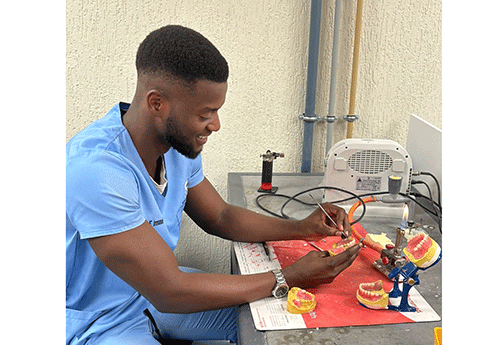Since the establishment of the University of Namibia School of Dentistry, the country has steadily improved on access to dentistry, although it still has a long way to go to meet World Health Organisation standards.
Namibia has only three maxillofacial surgeons, two orthodontists, and one orthodontist who mostly operates in the private sector, something that the University of Namibia School of Dentistry aims to fill by equipping students with the necessary exposure to lift the burden, said public health specialist Dr Juvenary John Rutabanzibwa.
He added that at least the Katutura State Hospital has one maxillofacial surgeon and gum specialists, something worth noting, but a new school will have growing pains.
The first cohort of the school of dentistry who started in 2018 saw 19 students graduating in 2022 from a class of 23, and 19 students in 2024.
For now, the faculty, due to limited resources, can only accommodate 25 students per intake.
“This is where you do medicine, but once you are done, you come to the third year to do pre-clinical, and this is where dentistry starts commanding that we need students that can match our infrastructure,” Rutabanzibwaexplained.
The Unam School of Dentistry used to select 18 students, but because of the demand, they have slightly increased to 25, but cannot increase this number further.
“Otherwise you will ruin the quality, and it goes on. They come to intensive fourth and fifth year, which are purely clinical and require dental chairs. The number of dental chairs determines the number of students we can have.”
The administrator also indicated that one lecturer can only supervise four students, and anything beyond that will never be accredited by the council because, “everything is highly controlled, and this is because of the quality we are looking for.”
The school is young and growing, with Rutabanzibwa saying they need support and value stakeholders intending to produce specialists to address the gap that Namibia has.
“This is not only in dentistry, but in medicine as well. What we need now are specialists more than anything else, people who are going to mentor our juniors, Namibia trains a lot of general practitioners in dentistry and medicine, but it’s time to move to specialists,” stated Rutabanzibwa.
New Era found final-year dental student Frans Immanuel perfecting his craft at the campus, adding that he has seen many teeth problems in Namibians.
“Some of these include cavitation on teeth surfaces which eventually leads to teeth being eaten away in certain parts. And yes, it is treatable. The other condition that I have noticed is dental caries, which is caused by diet like eating a sweet and not brushing your teeth further causing bacteria and slowly eating the teeth,” highlighted Immanuel.
He added that black spots seen on teeth are a progression of such foods that accumulate on those surfaces because of not brushing. Periodontitis, which is an inflammation of the gums, is common among Namibians.
The determined final-year student wishes to specialise, fill the gap that exists in the country’s dental space, and offer wider access to dental care.
Rutabanzibwa said, “It is true there is scarcity of dentistry in the country. World Health Organisation (WHO) standard requires that one dentist should serve a population of not more than 7 000 but in Namibia, there are some areas or areas where one dentist is serving more than 200 000.”
“Our school aims to merge the balance. For now, we have produced 36 dentists and 18 of them have just finished their internship training in May. They will be distributed to district hospitals in the country.”
The public health specialist indicated that for one to study dentistry, prospective student must have completed grade 12 AS level, 35 points in five subjects, namely: English, Mathematics, Biology, Chemistry, and Physics.
“We also have mature entry, for anyone who has completed relevant science degree, whether nursing, general science, probably majoring in biology and chemistry. They can also join the school of dentistry through mature age entry, but they must have completed their degrees,” he stressed.
Rutabanzibwa said in the road map of the school, they would have wanted to establish post-graduate studies but because of acute shortage of specialists, they have not been able to do that.


